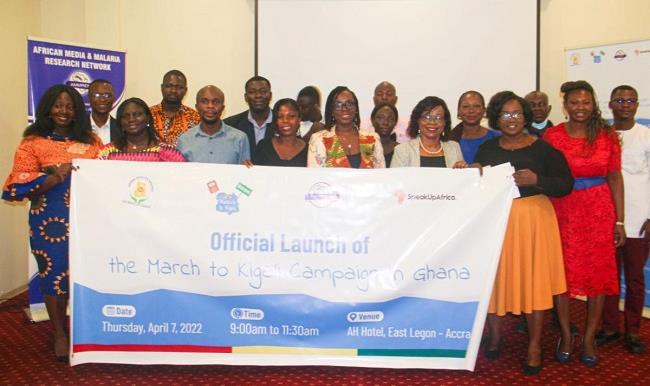The “March to Kigali”, a campaign led by a group of like-minded civil society organisations from across Africa and supported by Speak Up Africa, is said to have garnered the engagement of over 300 signatories. The campaign urges global leaders to prioritise the elimination of malaria and Neglected Tropical Diseases (NTDs) at the Kigali summit, which held on Thursday, June 23, 2022, alongside the Commonwealth Heads of Government Meeting (CHOGM).

With these diseases disproportionately affecting the vulnerable members of society and adversely impacting Africa’s economic and social development, the March to Kigali campaign gathers global attention to accelerate action to end malaria and NTDs on the continent.
Every two minutes, an African child dies from malaria. The continent accounts for over 90% of global malaria deaths and over 40 per cent of the global burden of NTDs is in Africa. Efforts to eliminate these diseases are stifled by inadequate health systems and limited programme funding coupled with less attention and prioritisation on the global and regional stage, according to observers.
This Kigali Summit is said to present a historic opportunity for world leaders to reaffirm commitments to end these diseases and their untold suffering and misery on billions of people. Through the March to Kigali campaign, the campaigners are calling for domestic resource mobilisation for increased and sustained resources aligned with the co-financing requirements of The Global Fund amounting to $18 billion required to get the world back on track toward building resilient and sustainable systems for health.
“The March to Kigali campaign acknowledges the strength of the Kigali Summit in convening key decision-makers to bring united global attention to malaria and NTDs. These diseases are entirely treatable and preventable but are still a major obstacle to economic and social development in Africa, affecting the most marginalised populations,” says Yacine Djibo, Founder and Executive Director of Speak Up Africa.
The campaign also calls for a renewed focus on integrating malaria and NTDs control and elimination. Multi-disease solutions can potentially improve healthcare system financing efficiencies with existing integration opportunities to benchmark on. For example, Senegal’s National Malaria and Control Programme rationalise efforts and costs by using its platform to collect data on both diseases.
The March to Kigali campaign builds on the existing partnerships and platforms of the “No to NTDs”, and “Zero Malaria Starts with Me” campaigns and aims to secure commitments from national and sub-national stakeholders to end these epidemics by 2030 as part of the Sustainable Development Goals (SDGs). It includes political engagement, private sector engagement, civil society, and youth engagement. Civil society organisations (CSOs) from across Guinea, Ivory Coast, Senegal, Burkina Faso, Ghana, Benin, and Niger are leading the charge by increasing public awareness and political engagement in eliminating malaria and NTDs.
In Sierra Leone, 12 leading recording artists released “Malaria e Don Wan Dae Na Mi Han”, a music video about malaria prevention and treatment. Community health workers in Sierra Leone also received training to be the first line of defense against these diseases, and over 100,000 malaria rapid testing kits were distributed in Burkina Faso.
Additionally, the through “Lines of Impact” initiative, the campaign works with African journalists from Benin, Burkina Faso, Ghana, Nigeria, Senegal and Togo to develop quality articles on NTDs and malaria.
“Neglected tropical diseases received little attention in the media. Mass media can play a huge role in disseminating information, influencing public behavior, to ultimately curtail the spread of disease,” says Dr Charity Binka, Executive Secretary of the African Media and Malaria Research Network (AMMREN) and country lead of the March to Kigali campaign in Ghana.
More than 300 civil society and local organisations, media outlets, and individuals across the continent have signed the “March to Kigali” call to action, demonstrating the incredible commitment at the country and continental level to ending these diseases.
